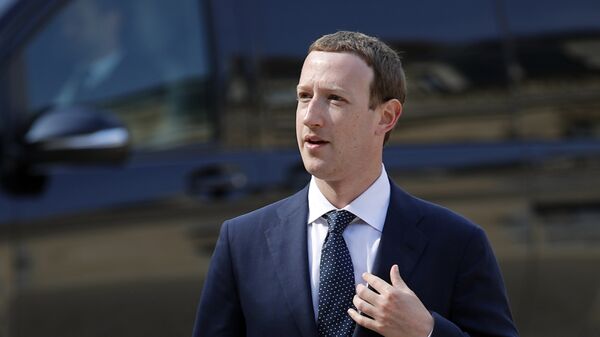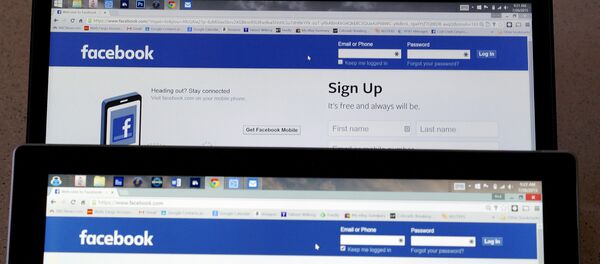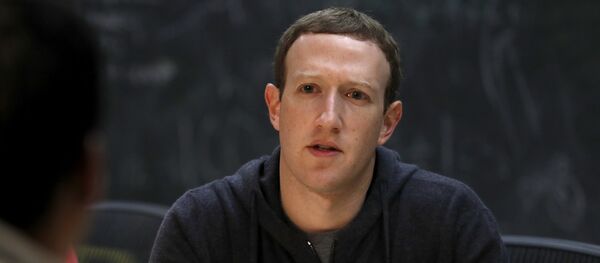Since March, Facebook has been under fire after it emerged that the personal data of about 50 million of its users had been harvested by the consultancy firm Cambridge Analytica without users' permission. The data was allegedly used to predict and influence the behavior of US voters in the 2016 elections. The company reportedly received information about users through a personality app developed by Aleksandr Kogan, a Cambridge University researcher.
Web developer and technologist Chris Garaffa told Radio Sputnik's Loud & Clear Monday that Facebook and other social media platforms primarily make their revenue through advertising.
"Because of the outcry, [Facebook] is going to be clamping down on who can see their ads. One of the things they are going to stop using is Partner Categories globally. They've already done this in the EU, particularly in Germany, France and the UK," Garaffa told hosts John Kiriakou and Walter Smolarek.
In a statement released by Facebook in March, the social media giant wrote, "We want to let advertisers know that we will be shutting down Partner Categories. This product enables third-party data providers to offer their targeting directly on Facebook. While this is common industry practice, we believe this step, winding down over the next six months, will help improve people's privacy on Facebook."
"There's also this big controversy about political ads," Garaffa added.
"Facebook has launched a new service [where] you can search ads. You have to log into Facebook to see the ads that people have bought. It's [providing] a little more transparency, and it shows who paid for the ad, which could be an important and significant thing in the political climate when corporations and super PACs have unlimited funds to spend on ads. Overall, it's a good thing that Facebook is doing this, but it is only a result of the public outcry over all of these privacy scandals," Garaffa noted.
In March, Facebook announced that it was creating a new database where people can search for political ads and see how many impressions they have received and who has paid for them.
"People in the US will be able to see who's running a political ad, how much money was spent on it, how widely it was seen and who the ad reached — for example age, gender and location. Advertisers will also have to share who paid for the ad… Helping people to understand who's trying to influence their vote will help us better defend against foreign interference and other abuse," Facebook said in its March statement.
Last week, US President Donald Trump also accused Twitter of "shadow banning prominent Republicans" after the names of multiple Republican lawmakers did not show up on the website's dropdown search boxes.
In a blog post last week, Twitter defined "shadow banning" as "deliberately making someone's content undiscoverable to everyone except the person who posted it, unbeknownst to the original poster."
However, according to Twitter, it doesn't intentionally hide accounts depending on political affiliation.
"We identified an issue where some accounts weren't auto-suggested in search even when people were searching for their specific name. To be clear, this only impacted our search auto-suggestions. The accounts, their tweets and surrounding conversation about those accounts were showing up in search results. As of yesterday afternoon, this issue was resolved," Twitter wrote in its blog post.
In addition, YouTube is also facing backlash for allegedly allowing conspiracy videos to flourish on the website. On Monday, searching "Tom Hanks" on YouTube yielded videos falsely suggesting that Hanks is a pedophile. Although according to reports, fringe videos are making it to the top of YouTube thanks to QAnon followers. QAnon is a conspiracy theory based on an unnamed source — or sources — colloquially known as Q, presumably American, who claims to have access to classified information involving Trump, his administration and their opponents.
"The algorithm is only as smart as the people behind it and people are writing that code," Garaffa told Radio Sputnik.
"People will try to game the algorithm, especially these right wing and conspiracy channels. YouTube isn't doing anything about it. There are some brilliant folks there who could easily fix it, and they are not because [these videos] are getting views. They recently limited the reach of Alex Jones, a famous conspiracy theorist. They didn't ban his account because he gets hits on YouTube. What is it comes down to is, it's about the money, the ad views and the impressions," Garaffa noted





